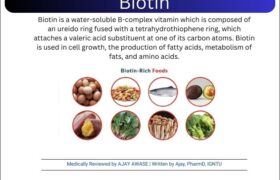Medically Reviewed by AJAY AWASE | Written by Ajay, PharmD, IGNTU
Sources of Content: Strengthening Knowledge and Understanding of Dietary Supplements
Biotin – Introduction

“Biotin, a member of the B vitamin family, is a vital nutrient found naturally in certain foods and sold as a dietary supplement. This water-soluble vitamin serves as a cofactor for five carboxylases (propionyl-CoA carboxylase, pyruvate carboxylase, methylcrotonyl-CoA carboxylase [MCC], acetyl-CoA carboxylase 1, and acetyl-CoA carboxylase 2) that facilitate important reactions in the metabolism of fatty acids, glucose, and amino acids [1-5]. Additionally, biotin is crucial for histone modifications, gene regulation (by influencing transcription factor activity), and cell signaling.”
An essential component of the body’s enzymes that break down materials like lipids, carbs, and other compounds is biotin. Low biotin levels are difficult to diagnose; symptoms include thinning hair and a red, scaly rash around the mouth, nose, and eyes. There isn’t a reliable test for this condition.
For biotin shortage, biotin is used. It is also frequently used to treat brittle nails, hair loss, and other ailments, however these claims are not well-supported by scientific research. Supplemental biotin may cause issues with certain laboratory tests. If you need any blood tests and you take biotin supplements, talk to your doctor.
Some foods that contain biotin include:
foods that contain biotin include:
Bananas:
- Approximately 0.2 micrograms (or 1% of the daily value) of biotin can be found in a small banana (105 grams).
Egg yolks:
- Egg yolks contain biotin, which helps shield hair from breaking.
LiverLiver
- includes protein, folate, and approximately 30.8 mcg of biotin.
Sweet potatoes:
- Sweet potatoes provide 8% of your daily required amount of biotin in a serving size of 1/2 cup.
Walnuts:
- Nuts like walnuts and others are rich sources of biotin.
Mushrooms:
- Biotin helps protect mushrooms from parasites and predators while they grow.
Avocados:
- Avocados are a good source of biotin, which can help prevent dry skin, brittle hair, and brittle nails.
Uses of Biotin
| Use | Explanation |
|---|---|
| Energy Production | A coenzyme that helps the body break down proteins, lipids, and carbs into energy is called biotin. |
| Skin Health | Through its support of cell development and repair, biotin helps maintain healthy skin. Additionally, it might aid in the relief of skin disorders like dermatitis and eczema. |
| Hair and Nail Growth | It’s common knowledge that biotin encourages strong hair and nails. Biotin deficits have been linked to brittle nails and hair loss, though further research is required. |
| Nervous System Function | The brain and spinal cord are parts of the nervous system, and biotin is important for their health. |
| Pregnancy and Breastfeeding | Sufficient intake of biotin is essential for the development of the fetus and baby during pregnancy and lactation. |
| Metabolic Functions | The production of fatty acids and the metabolism of amino acids are two metabolic pathways in which biotin is engaged. |
Uses of Biotin
Most Likely to Work for
A lack of biotin. Low blood levels of biotin can be treated and prevented by oral or injectable biotin. A daily oral dose of up to 10 mg of biotin has been used to treat and prevent deficiencies. Only a medical professional is qualified to provide a biotin injection.
Potentially ineffectual for
sclerosis multiplex (MS). Oral use of high-dose biotin does not lessen impairment in MS patients. Additionally, the chance of relapsing appears to be unaffected.
rough, scaly skin (seborrheic dermatitis) on the face and scalp. Infants’ rash does not appear to get better after using biotin.
Potential Side Effects of Biotin
| Side Effect | Explanation |
|---|---|
| Skin Reactions | High dosages of biotin can induce skin responses such as rashes or hives. |
| Interference with Lab Tests | Biotin can interfere with some laboratory tests, sometimes resulting in incorrect results. |
| Digestive Issues | Excessive biotin intake can lead to digestive issues like nausea, vomiting, and diarrhea. |
When eaten by mouth:
Most people are expected to be safe taking biotin at levels of up to 300 mg per day for up to 6 months. However, it is most typically used in smaller doses of 2.5 mg per day.
When used on the skin:
Biotin is most likely safe for most people when used in cosmetics containing up to 0.6% biotin.
Important Precautions and Warnings for Biotin
While biotin is generally safe, consider the following:
- Pregnancy and Breastfeeding: Consult your healthcare professional for advice on biotin intake throughout these periods.
- Medical Condition: If you have a liver or renal condition, see your doctor before using biotin.
- Medication Interactions: Biotin may interact with several drugs. Inform your healthcare practitioner of all medications you are taking.
- Allergic Reactions: If you encounter any unpleasant symptoms while taking biotin, discontinue use and seek medical attention.
Dosing
Foods containing small levels of biotin include eggs, milk, and bananas. It is advised that individuals take 30 mcg daily. The same amount should be consumed throughout pregnancy. When breastfeeding, 35 mcg should be taken daily. The recommended amounts for children vary depending on their age. Speak with a healthcare expert to determine the optimal dose for your unique situation.
Biotin-Rich Foods
| Food | Biotin Content | Benefits |
|---|---|---|
| Bananas (105 grams) | 0.2 mcg (1% DV) | Supports overall health. |
| Egg Yolks | High in biotin | Helps protect hair from breakage. |
| Liver | 30.8 mcg | Provides biotin, protein, and folate. |
| Sweet Potatoes (1/2 cup) | 8% DV | Supports overall health and may aid in digestion. |
| Walnuts | High in biotin | Provides biotin and other essential nutrients. |
| Mushrooms | High in biotin | Protects mushrooms from parasites and predators. |
| Avocados | Good source of biotin | Helps prevent dry skin, brittle hair, and brittle nails. |


Leave a Reply